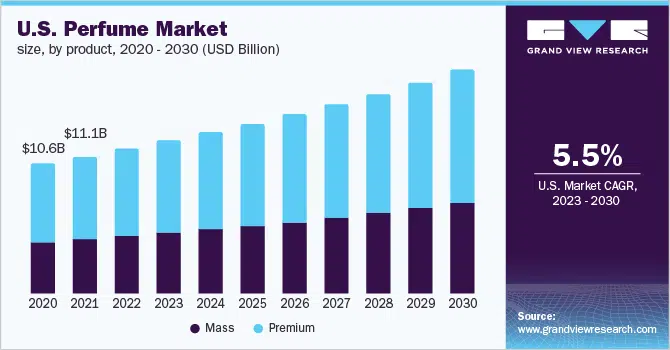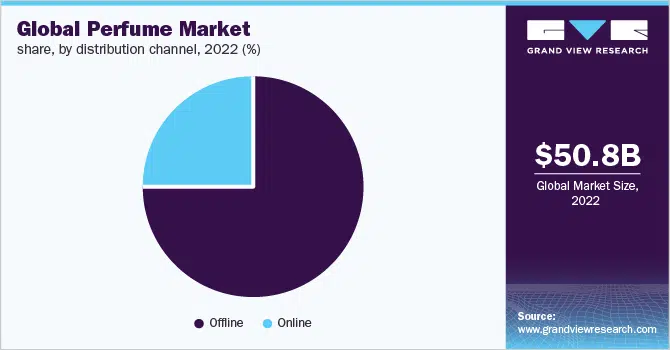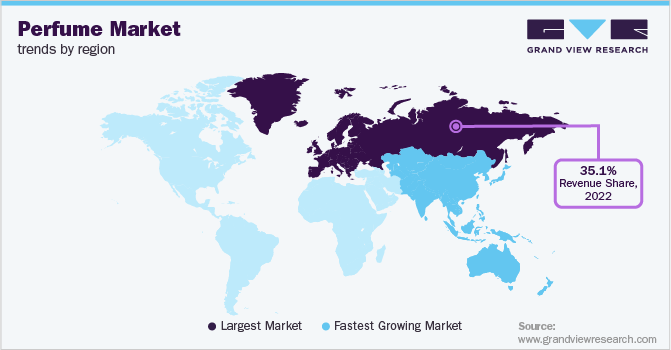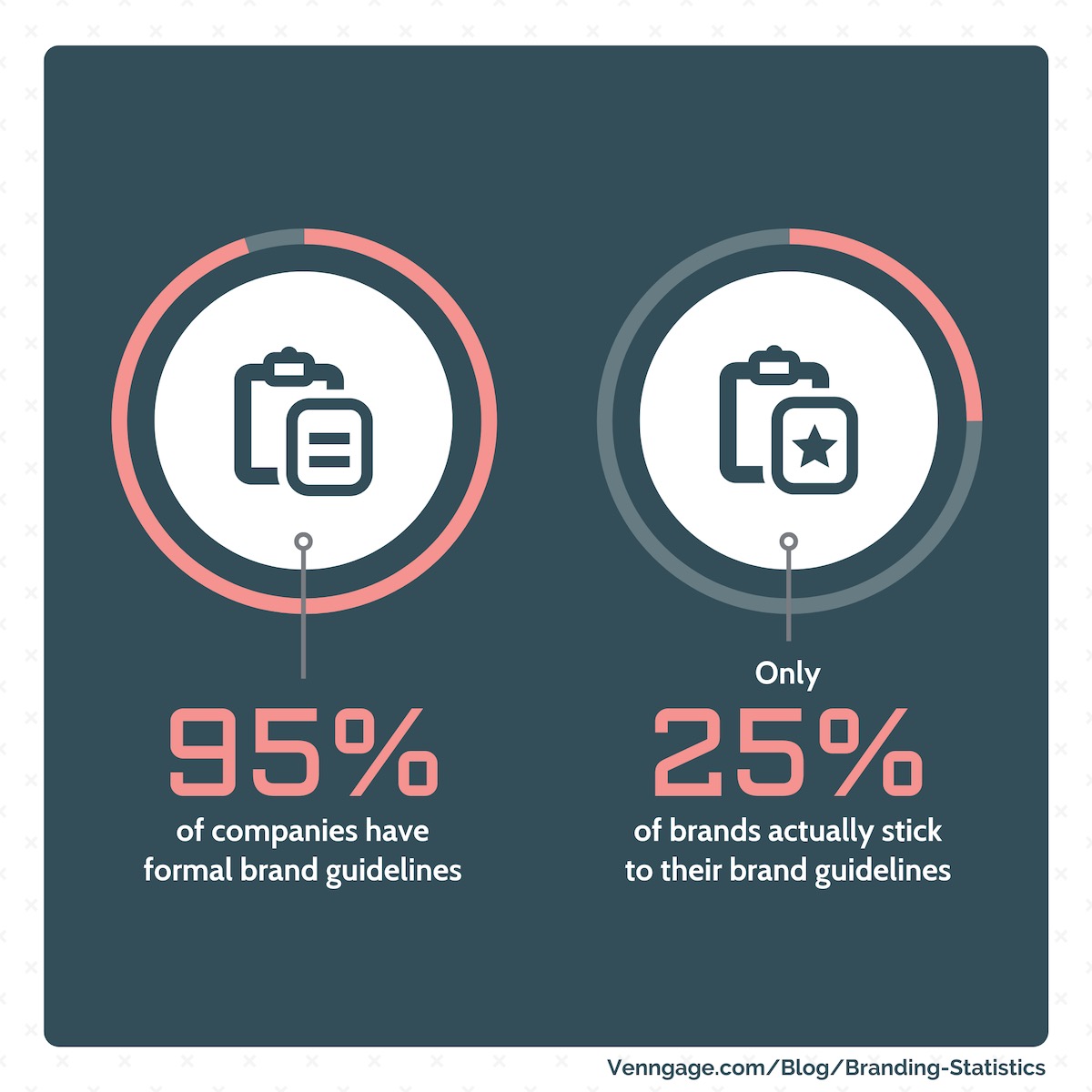The global fragrance and perfume market reached a value of $48.05 billion in 2023. With an increasing demand for new and unique scents globally, there is a massive opportunity right now for aspiring perfumers. From boutique perfumeries to large fragrance houses, options in this industry are vast.

If you’ve ever dreamed of becoming an entrepreneur who blends essential oils into beautiful fragrances now is the time to start. Modern technology allows small producers to create signature scents affordably and access global audiences.
This guide will walk you through how to start a perfume business. Topics include market research, obtaining business insurance, registering an EIN, forming a legal business entity, customer focus, and more.
1. Conduct Perfume Market Research
Market research is essential to starting your own perfume brand. It provides valuable insight into your potential customers, building a valid marketing strategy, trends among products and fragrance samples, and other valuable details for starting your own perfume line.

Some details you’ll learn about fragrance creation for your perfumes or cologne as you conduct market research include:
- The rising demand for natural and organic fragrances, increasing consumer spending power, and a growing trend of personalization.
- The fastest growth is expected in the Asia Pacific region, especially in countries like China, India, and Indonesia.
- The North American and European markets will continue to dominate in total sales value, together accounting for over 60% of global demand.
- Private custom perfumery also represents an untapped opportunity valued at over $3 billion globally.
- Bespoke fragrance customers are often willing to pay four times more than the cost of generic perfumes.
In summary, a growing global customer base willing to pay a premium for personalized and niche fragrances, combined with opportunities to leverage e-commerce channels and tap into emerging markets, signals a strong growth period ahead for the global perfume industry in the coming five years.
2. Analyze the Competition
Understanding the competitive landscape is crucial for new entrants in the fragrance market before a perfume launch. Conducting thorough competitor analysis enables you to identify key players, understand pricing, and learn about your target market through customer feedback.

For brick-and-mortar perfumeries, directly visit competitor stores and boutiques while acting as a typical customer. Analyze in-store branding, staff service levels, range and types of scents available, merchandising, and displays used to showcase products.
Compare pricing across popular fragrance categories like woody scents and floral scents and take note of discounts, sales assistance, and loyalty programs offered. This gives tangible insights into customer experiences and how you can improve upon them with your in-store offering.
When researching online perfume brands and sellers, tools like Google Analytics and SEMrush provide detailed traffic stats including top landing pages, keywords, traffic volumes, geos, and referring sites. Analyze competitor website content using Alexa or SimilarWeb to surface marketing strategies.
Sign up for competitor email newsletters and evaluate the types of email campaigns and promotions they deploy. Monitoring competitors online allows you to not only see types of fragrances and price points sold but also optimize every aspect of your digital presence from site design to search visibility to social engagement.
By leveraging both offline and online techniques to continuously analyze top players selling and marketing perfumes locally and globally, new businesses can carve out a unique space based on targeted product offerings, pricing, tailored customer experiences, and differentiated brand identity.
3. Costs to Start a Perfume Business
When starting a perfume brand or perfumery, initial investments cover product development, equipment and facility requirements, legal and professional fees for permits and registration as well as inventory production for the first product batches.
Startup Costs
- Product Development: Working with professional perfumers to create customized signature scents or your formulations requires an upfront investment of $5,000 to $10,000.
- Equipment: Expect to spend between $5,000 to $15,000 outfitting your commercial perfumery lab facility with essential distillers, evaporators, and mixing units.
- Facilities & Rent: Annual facility lease costs would range from $7,200 to $12,000 for a small startup operation depending on location.
- Licenses & Permits: Business operating licenses vary across states but expect to budget $50 to $100 for registration fees.
- First-Year Insurance: Product liability insurance to cover any issues with perfume batches roughly costs $1,800 per annum for 1 to 2 million dollars in coverage based on your revenue estimates.
- Staff/Contractors: In the first year, it’s common to leverage part-time contracted perfume consultants and production assistants at $15 to $25 per hour as needed instead of full-time employees.
- Starting Inventory: With average production costs at $5 to $10 per 50ml bottle, estimate $2000 in materials and labor for startup inventory.
- Other costs: Website development, branding, and packaging design can cost between $1500 to $3000. Office equipment and launch advertising/marketing budgets typically range from $1000 to $5000.
In total, budget $50,000 to $100,000 in start-up capital to launch and sustain a small perfume business for the first 6 to 12 months before revenue stabilizes.
Ongoing Costs
On the ongoing front, key monthly expenses will include:
- Rent & Utilities: Estimate $6000 per month
- Equipment Lease Payments: Around $500 per month
- COGS Per Product: $3 to $6 variable cost per item
- Website Hosting & Software Subscriptions: $100 to $200 per month
- Insurance & Professional Fees: $200 per month
- Marketing/Advertising: $500+ per month
Therefore, expect around $10,000 in fixed monthly operational overhead. The variable cost of goods depends directly on monthly production output and can scale up accordingly. As revenues ramp up, building a dedicated in-house team also becomes an additional annual expense.
4. Form a Legal Business Entity
When establishing a fragrance brand, product liability and protecting personal assets should be top priorities. Forming a limited liability company (LLC) limits your exposure if sued while giving more flexibility over ownership structures compared to corporations.
Sole Proprietorship
Easy to set up with minimal compliance requirements, this exposes the perfumery owner to unlimited liability however so all business debts and legal issues can impact personal assets. Income and losses are also taxed directly without corporate separation. Ideal only as an introductory structure while getting started.
Partnership
Common for small co-owned perfumeries, financial risk is shared across partners who manage branding and product development collaboratively. However, each partner’s assets are at stake for collective liabilities. Decision-making authority also needs outlining to avoid disputes between partners over time.
Limited Liability Company (LLC)
The optimal middle ground involves lower compliance than corporations with liability limitations similar to a corporation. Only the LLC assets like equipment or inventory are impacted by perfume business lawsuits or debts instead of the owner’s house or savings accounts. Tax flexibility allows filing as a sole proprietorship, partnership, or corporation.
Corporation
Although corporations limit financial liability for shareholders, they require regular corporate filings, directors meetings, and issuance of stocks, and involve stricter record keeping. These administrative overheads tend to suit much larger perfume enterprises. However, small business loans are easier to obtain.
5. Register Your Business For Taxes
An Employer Identification Number (EIN) is a unique 9-digit number that identifies your business to the IRS and state agencies for tax and reporting purposes. Even if you won’t have employees, an EIN is compulsory when forming an LLC or corporation entity for your perfume brand.
The EIN application process only takes a few minutes online and generates your EIN immediately. Simply navigate to the IRS EIN Assistant and answer some basic questions about your business structure and ownership details. On the final page, your EIN is displayed upon submission.
This identifier number will be vital for many tax situations like:
- Opening a business bank account
- Registering licenses and permits
- Paying employees and filing payroll taxes
- Calculating business income taxes
- Interacting with suppliers and vendors
Along with your federal EIN, also contact your state revenue or taxation department to comply with local sales tax regulations before selling any perfume products. Failing to collect and remit ongoing state sales tax can lead to financial penalties down the line so build this into your accounting workflows from day one.
The main costs associated with both federal and state registrations relate to tax compliance services from an accountant or bookkeeping software subscriptions for automated reporting. Expect ongoing accounting fees of $200+ per month.
6. Setup Your Accounting
Robust accounting practices form the financial backbone of any successful perfume enterprise right from inception. Tracking income and expenses diligently provides data-driven insights into profitability, cash flow timing, and tax liabilities – helping scale intelligently.
Accounting Software
Investing in tools like QuickBooks allows perfume makers to connect bank accounts and reconcile transactions automatically. Invoicing customers, recording sales receipts, managing payables, and tracking inventory levels also become seamless. Detailed financial reports are generated with just a few clicks.
Hire an Accountant
However, software cannot replace an accountant’s expertise in strategizing financial processes and ensuring full compliance. A certified accountant averages around $100 to $200 per month for part-time controller services like monthly reconciliations, account classification, sales tax calculations, and financial statement preparation.
Open a Business Bank account and Credit Card
Separating all perfume company transactions from personal finances via dedicated checking/savings accounts and credit cards simplifies record keeping and tracking for your accountant. Business credit cards often offer higher limits once the company credit profile is established and require supplying the company’s EIN.
7. Obtain Licenses and Permits
Before selling your first perfume bottle, several federal and state licenses must be secured to legally and safely manufacture cosmetic products in compliance with regulations. Find federal license information through the U.S. Small Business Administration. The SBA also offers a local search tool for state and city requirements.
Food and Drug Administration (FDA) Registered Facility Number: All cosmetic creators including perfume compounders must register their workspace facility via the FDA’s online registration portal. This unique facility number proves your adherence to Current Good Manufacturing Practices (CGMPs) for quality and safety.
Environmental Protection Agency (EPA) Identification Number: Handling chemical ingredients also requires obtaining an EPA ID number to track hazardous waste activities. For perfume businesses, disclosure helps regulate waste disposal from alcohol-based formulations, chemical containers, and discarded batches.
NICNAS Registration: For entrepreneurs selling perfumes containing more complex aromatic chemicals and synthetics, getting listed in Australia’s regulated chemical inventory system NICNAS is mandatory. It ensures public safety through chemical registrations.
State Business Licenses: Additionally check state department websites like the health and consumer affairs boards for any other location-specific perfume laboratory permits, especially if dealing with food-grade and allergen-free natural oils. Hawaii for instance needs added cosmetic licenses for perfume production facilities.
Plan for at least $750 in initial permit and license costs when starting perfume operations along with recurring renewal fees every 1 to 2 years thereafter. Display all your registrations and FDA facility numbers prominently in-store and on your website. Stay in good legal standing by filing documentation promptly.
8. Get Business Insurance
Business insurance shields perfume entrepreneurs against unexpected disasters from raw material theft to customer allergy claims. Without policies covering inventory, property damage, and liability, a single catastrophic event can shutter operations permanently.
Consider if a failed batch emitting noxious fumes forces evacuation of your perfumery facility. Repairing structural damage and defending air quality violation lawsuits without insurance can lead to massive debts. Or imagine online systems being hacked to steal customer credit card data used in perfume orders.
Cyberextortion costs to regain data access and address identity theft incidents can cross six figures without cyber insurance support. Another common risk comes from customers having allergic reactions to specific natural oils. Product liability insurance covers medical payments and legal defense expenses.
Now contrast those worst-case scenarios with having tailored coverage like:
- General Liability Insurance covering bodily injury and property damage with a $1 million policy limit at approx $40 per month.
- Professional Liability Insurance guarding against customer claims of losses due to your perfume products at $60 per month.
- Cyber Insurance safeguarding digital assets and providing customer breach support for $100+ per month.
The peace of mind and risk mitigation make business insurance well worth 4-8% of revenues. An independent insurance broker can assess protection levels needed for your perfume enterprise size and location. Expect to provide details on inventory size, facility square footage, security protocols, customer volumes, and more.
Get quotes from multiple commercial insurance providers before selecting the best perfume business coverage aligned to your budget and risk appetite.
9. Create an Office Space
An office or dedicated workspace allows perfume entrepreneurs to separate professional and personal lives while also enabling simple collaboration with team members or consultations with clients.
Home Office
Utilizing a spare room as a home office incurs no rental overhead and allows convenient access for late-night work sessions during initial concept or formulation testing. However, bandwidth constraints may exist for accessing software tools and storage space remains limited. Expect costs of approximately $2,000 to $5,000.
Coworking Space
As product iterations complete and early customers trickle in, shared offices like WeWork prove useful for client meetings and brainstorming with freelance perfumers. Customizable membership plans provide infrastructure like Wi-Fi, conference rooms, and front desk staff from $300 per month upwards.
Retail Office
Perfume brands investing in storefronts can maximize square footage via a back office for managing inventory, formulation equipment, and packaging along with admin duties. While retail visibility has benefits, integrating office activities within a customer floorspace can prove distracting to daily workflow.
10. Source Your Equipment
From distillation units to maceration systems, outfitting a commercial perfume lab requires thousands of specialized equipment. Balancing affordability with reliability means exploring new, used, and even rented options when starting.
Buying New
Acquiring shiny brand-new pro-grade extraction mixers, evaporators, and chromatography setups from reputable dealers like The Perfumers Apprentice and Fleurchem ensures flawless precision and safety assurances.
Buying Used
Tap online marketplaces like Facebook Marketplace and Craigslist to uncover second-hand lab tools often from defunct fragrance businesses seeking to liquidate assets. While used 100L evaporators or custom blending vats typically sell for 50-75% below retail pricing.
Renting
Equipment rental houses like Aroma Designing allow economical short-term access to expensive infrastructures like industrial high-shear mixers and compounders costing $15,000 without huge upfront bills. Useful during seasonal production spikes or initial trial batches when investing in ownership proves cost-prohibitive.
Leasing
Equipment financing through multi-year lease agreements enables spreading equipment costs over 3 to 5 years interest-free while leveraging gear throughout. $80,000 worth of imported 500L Italian extractors and chillers could instead involve a $2,000 monthly lease over a 5-year term after a small down payment.
11. Establish Your Brand Assets
Crafting a memorable brand identity helps perfume companies stand out in a crowded fragrance market while also building customer loyalty over time through visual and messaging consistency across touchpoints.

Getting a Business Phone Number
Acquiring a dedicated business phone line via providers like RingCentral enables projecting professionalism when engaging with prospective retailers or individual clients. Call forwarding, voicemail transcriptions and toll-free options give flexible answering whether from your home office, lab, or popup shop.
Creating a Logo and Brand Assets
Invest in a customized perfume logo like those created by Looka to reinforce your brand visually on the packaging, store displays, and marketing collateral. Typically a minimalist icon or emblem with complementary fonts, colors, and graphic elements ties together the website and merch.
Creating Business Cards and Signage
Business cards from Vistaprint containing vital contact info and a memorable logo help initiate deals with buyers or suppliers while signage establishes shop visibility. Well-designed visual assets trigger brand recall during those in-person selling moments.
Purchasing a Domain Name
Secure the perfect domain name representing your perfume brand’s spirit via registrars like Namecheap. Keep it short, evocative, and easy to spell while making social handles and email addresses match for simplicity.
Building a Website
E-commerce websites from DIY platforms like Wix or custom-coded can function as digital catalogs and sales channels while conveying product personalities via visuals, messaging, and, user experience design. For specialty concepts, commissioning a professional perfume site designer from Fiverr might suit over premade templates.
12. Join Associations and Groups
Tapping into industry networks delivers invaluable insights and partnerships for fledgling perfumers through collective wisdom and resource pooling.
Local Associations
Area chambers of commerce like the New York Chamber of Commerce host workshops, networking events, and industry introductions to support regional economic growth. National associations like the American Society of Perfumers provide access to research, education, and innovation networks outside your locale.
Local Meetups
Attend relevant meetups, fairs, and expos in your city discoverable via sites like Meetup. Rubbing shoulders with fellow creators and retailers helps benchmark product pricing, positioning, and gap areas through candid conversations. Annual conferences like the New York Perfume Expo also enable low-cost exposure and sampling.
Facebook Groups
Finally, tap specialized Facebook communities like the Makers Circle: Perfume and Perfumers marketplace for advice on technical challenges from fragrance photography tips to reviewing legal contracts. Free to access, these forums swap insights 24/7.
13. How to Market a Perfume Business
Implementing multifaceted marketing exposes budding perfume brands to new audiences while sustaining engagement with existing loyalists. Balancing digital discovery avenues with selective offline channels also attracts broad demographics.
Personal Networking
Tap friends, family, and colleagues to organically share your scent creation vision. Offer sampling kits for feedback while requesting connections to boutiques or department store managers. Positive word-of-mouth spreads brand familiarity faster than any ad.
Digital Marketing
- Running Google Ads campaigns focused on product benefits or gifting occasions that drive to your website or local lister pages.
- Testing Facebook and Instagram perfume promotions targeted by buyer personas and interests like luxury, beauty, and self-care.
- Creating video content on your formulation journey or demonstrating scent profile layering for YouTube and TikTok.
- Securing press coverage of new product launches or differentiators in industry publications.
- Maximizing search visibility via blogging around perfume personality matches, niche categories, and consumption trends.
Traditional Marketing
- Print full-page glossy ads in high-end fashion magazines or purchase sponsored content.
- Partner with outdoor event producers to gift celebrity attendees samples.
- Distribute tester samples at malls or busy public areas along with coupons.
- Host a pop-up scent exploration shop for increased local discovery.
- Run radio spots or podcast sponsorships aligned with your target market.
Experiment with various digital and traditional channels while tracking conversions to optimize your marketing recipe. Always reinforce brand messaging consistently across touchpoints.
14. Focus on the Customer
Delivering excellent customer service creates enthusiastic brand advocates who actively recommend your fragrances to friends or on social media.
Fragrances evoke emotional connections tied to personal memories and identities. Customers invest not just money but deeply rooted sentiments into purchasing signature scents. Patiently addressing buyer concerns about intricacies like formulation changes or recommending alternate options.
Surprises like handwritten thank you notes or bonus samples sent after a large first-time order delight clients used to transactional experiences with major fragrance houses. Your personal touch gets remembered and talked about, driving referrals.
Consider a customer whose customized perfume blend receives constant compliments from her social circle. When she writes about the joy of finding her signature scent created by patient perfumers focused on craftsmanship over quick sales, the positive endorsement holds more weight than any ad.
When selling your own fragrances, reputation, and trust built customer-by-customer eclipse production volumes and distribution reach. Competing with established players as a fresh business means focusing on relatability and individualized relationships around scent exploration.
